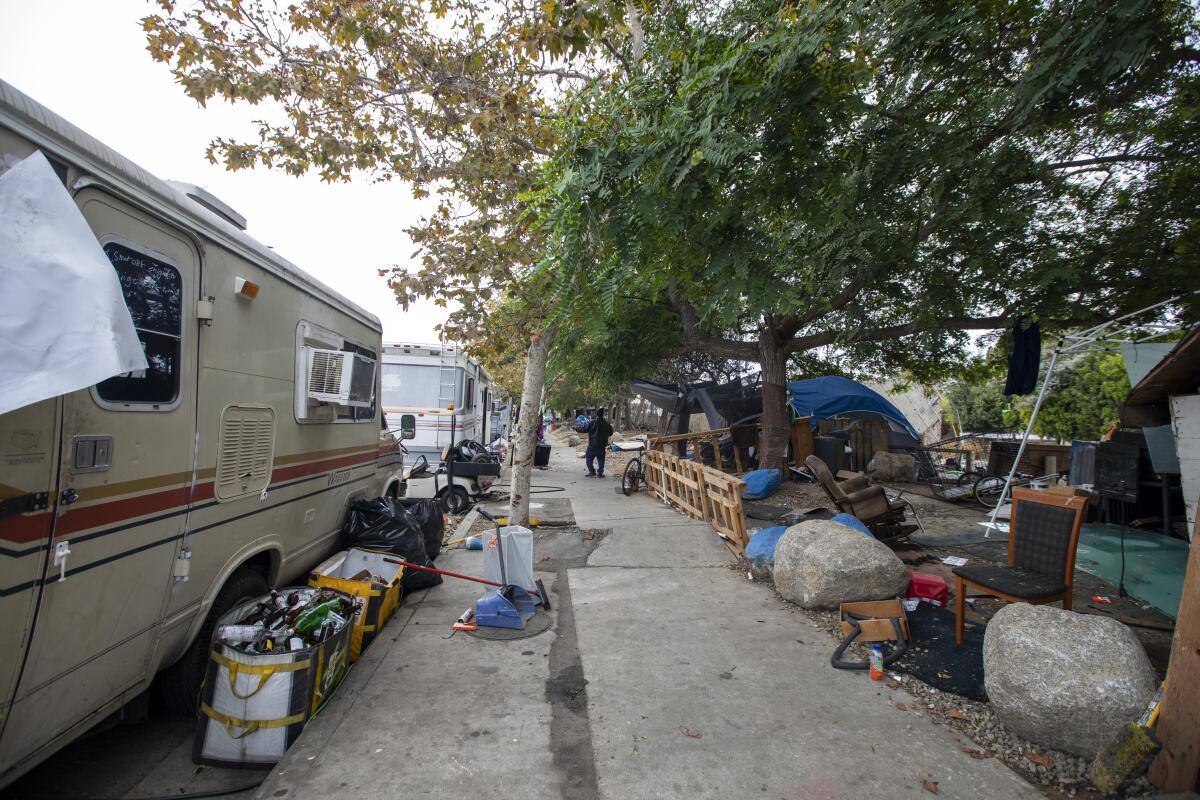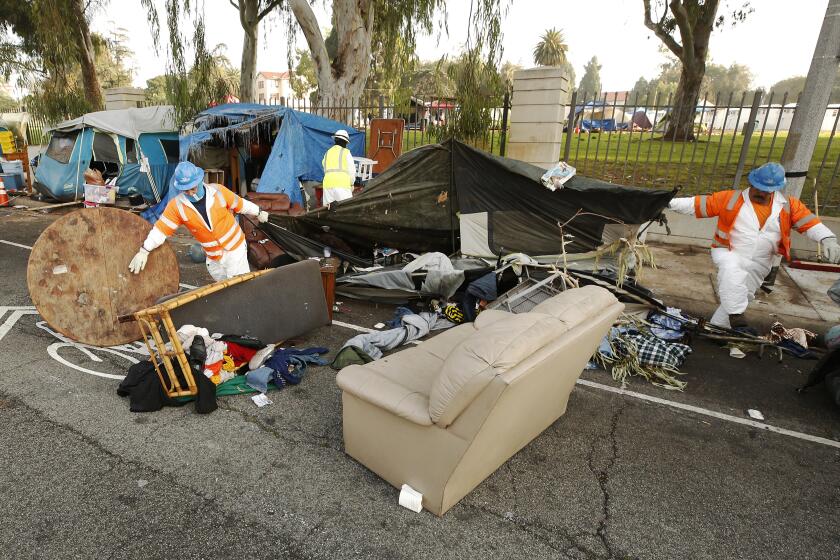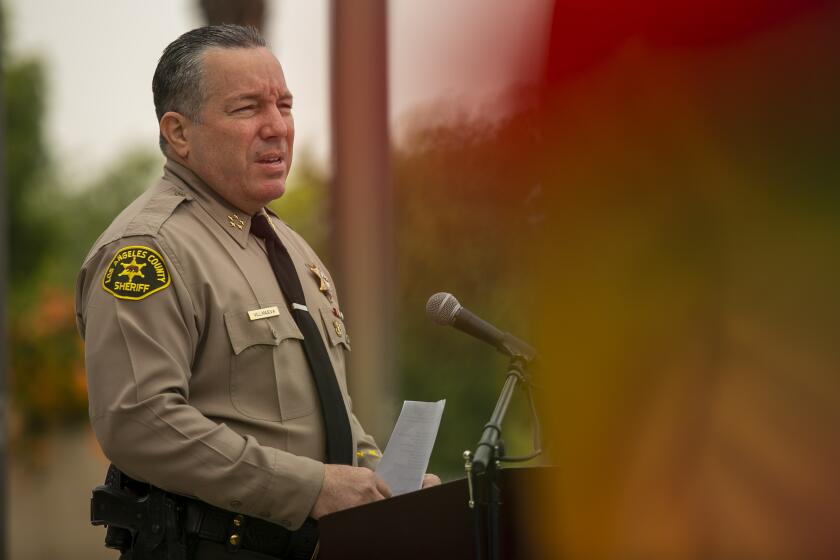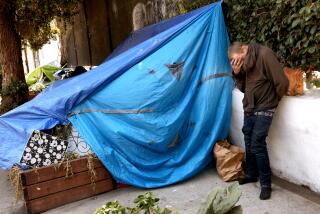Column: The homeless encampment next door in Venice — and the neighbors’ lives it has upended

- Share via
The stretch of North Venice Boulevard between Abbot Kinney Boulevard and Electric Avenue is a typically Westside juxtaposition of wealth and squalor.
To the west is Erewhon, the scandalously expensive organic grocery store where a basket of organic strawberries could set you back nearly $20.
To the east, past the shuttered Vice office, is a homeless encampment that is a jumble of ad hoc living spaces, tattered RVs along the curb, lots of detritus, and at least one oversize wooden doghouse with pillows and blankets.
The encampment, frustrated neighbors say, is rife with meth dealing and meth use, with prostitution, with amplified music powered by gas generators that rumble day and night, and with residents who threaten them verbally and sometimes physically.
The debate over how to handle homelessness and its attendant woes in our city has become so politicized that Douglas Caballero, 43, who lives across a narrow street from the encampment — and whose life has been upended by it — was reluctant to discuss the situation.
He, like so many others, is worried that speaking out against a homeless encampment is politically incorrect and will cause a backlash or retaliation of some sort. Neighbors told me stories about break-ins at houses, and in yards and cars, and enduring unbearable noise. More than one described the experience as being “terrorized.”
“There’s open fires, a gentleman who often brandishes a machete on his belt,” Caballero told me. “There have been shootings, gunshots. There is the day-to-day insanity of loud music at all hours. Constant screaming, constant fighting. We see daytime and nighttime drug deals. None of this makes us want to go over there and get to know the people.”
Two doors down, his neighbor Deborah Keaton, lives with her husband and 11-year-old daughter. Keaton is hardly the moneyed arriviste that egalitarian homeless activists in Venice sometimes rail against. In 1990, she bought her house for $300,000.
Members of a clean-up crew dismantled tents in a homeless encampment just outside the West Los Angeles Veterans Affairs campus on Monday morning.
“I’m a creative director, and I wanted to live near the ocean,” Keaton told me. “The Marina was new and boring. Venice was creative and interesting. It was dangerous. It was seedy. But it was fun. Abbot Kinney was artist’s studios behind storefronts.”
Keaton lives closer to the encampment than anyone, and in contrast to Caballero, she has reached out many times to Brandon Washington, the man with the machete. Often, she simply asks him to turn his amplified music down because her daughter is trying to sleep.
“Sometimes, he is so high that he walks over to the stereo and touches the dial and walks away,” she said. “I have said, ‘Come on, dude. Don’t be a jerk. You know the right thing to do.’ And then he will turn it down.”
One recent morning, shortly after her husband left for work, Washington rang her doorbell, which activated her Ring camera. She says he told her he needed to kill all the evil people in the world and wanted to know if her husband was evil. “I was terrified, but I tried to be normal,” she told me. “I said, ‘Please don’t hurt my husband.’ He could do anything. He has already hurt people. This is a ticking time bomb.”
Indeed.
Three years ago, Washington threatened David Mushegain, a fashion and music photographer, who happened to be FaceTiming with his father as he and a friend walked past the encampment.
“He comes up with a wrench in his hand and says, ‘Why were you recording us?’ He came at me.” Mushegain’s friend recorded it all on her cellphone camera. According to court records, Washington was convicted of assaulting Mushegain and sentenced to 164 days in county jail plus three years of probation.
“To have somebody living there that has threatened you before is intimidating,” said Mushegain. “We are living in a neighborhood where we have to call the police three times a day.... The frustration level has reached a tipping point. You start to understand why in New York in the ‘80s they had the Guardian Angels.”
Among other things, L.A. County’s top lawman wants to make it easier for gun owners to carry concealed weapons.
Last week, I walked over to the encampment to chat with Washington. He was somewhat unfocused but polite. He showed me his doghouse and told me he is a Venice native and second-generation member of the Shoreline Crips. His mother, he said, sold her nearby home a while ago and moved to Las Vegas. He told me there is no way he is leaving Venice and that he has never threatened to kill anyone.
All but one of the neighbors to whom I spoke said they support recalling embattled L.A. City Councilman Mike Bonin, who they believe protects the rights of homeless people at the cost of their own peace and security.
“Dealing meth is a crime, and stealing is a crime and making violent threats is a crime,” said Bonin’s deputy chief of staff, David Graham-Caso. “Being homeless and living in an encampment is not a crime. That’s where we get into this frustrating and challenging debate, where people say you are ignoring the crime. Treating addiction is a big part of solving this crisis, but it’s not where we focus because that is not the city’s role.” (That is the responsibility of the L.A. County Department of Public Health.)
The encampment’s residents are visited regularly by social service agencies, though no one has issued a grandstanding ultimatum the way Sheriff Alex Villanueva did in June, stepping on Bonin’s toes to force homeless people off Oceanfront Walk in Venice.
Sheriff’s Lt. Geff Deedrick, who leads the department’s Homeless Outreach Services, told me he visited the Venice Boulevard site a couple of weeks ago, spoke with residents and relayed their concerns to police, who are a frequent presence there.
“It breaks my heart for communities to be begging for help,” Deedrick told me. “To be honest, it can be done fairly easily, with compassion, dignity, civility and accountability.”
This week, signs went up announcing a “Major Cleaning” on Wednesday. Such plans in the past have been thwarted by coronavirus outbreaks in the encampment. “No Parking” signs are up as well, which means the RVs parked along the encampment will have to move. Already, neighbors are strategizing how to thwart their return.
Some plan to park their own cars along Venice Boulevard and fill them with tattered personal items so it will appear that someone is living in the vehicle, which means it cannot be towed.
“Put trash in your car?” said an incredulous Caballero. “All these people who worked hard and busted their butts to live here, this is the solution because we have no other levers to pull.”
More to Read
A cure for the common opinion
Get thought-provoking perspectives with our weekly newsletter.
You may occasionally receive promotional content from the Los Angeles Times.














